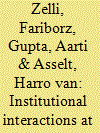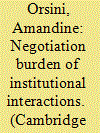|
|
|
Sort Order |
|
|
|
Items / Page
|
|
|
|
|
|
|
| Srl | Item |
| 1 |
ID:
175035


|
|
|
|
|
| Summary/Abstract |
Sustainable Development Goal 7 and the Paris Agreement reiterate the importance of a worldwide uptake of renewable energy. However, the present growth rate of renewables in the global energy mix is too slow to meet international targets. There exists at present a wide range of institutions with different characteristics that work internationally to promote a steeper increase. Whereas previous studies have examined the institutional landscape for renewable energy and the considerable interactions occurring across institutions, it remains unclear what the implications of these institutional interactions are for effectiveness. This paper assesses how institutional interactions can strengthen effectiveness, by focusing on three multi-stakeholder partnerships for renewable energy. Based on an expert survey and semi-structured interviews, the study provides both theoretical and empirical contributions to understanding institutional interactions in relation to effectiveness. Moreover, it provides insights on how to strengthen the effectiveness of multi-stakeholder partnerships for renewable energy. Results show that different levels and types of institutional interactions may influence effectiveness differently, with the sharing of procedural information and coordination mechanisms being considered most fruitful to increase effectiveness. Importantly, however, such interactions should not harm the autonomy, nor the efficiency of multi-stakeholder partnerships.
|
|
|
|
|
|
|
|
|
|
|
|
|
|
|
|
| 2 |
ID:
117946


|
|
|
|
|
| Publication |
2013.
|
| Summary/Abstract |
This article argues that institutional interactions that cut across the domains of trade and environment are embedded in overarching norms that shape their evolution and impact. In making this argument, it analyzes three cases of such interactions within the climate change and biosafety regime complexes: those relating to trade-related climate policies and measures, forest carbon sinks, and trade in genetically modified organisms. The analysis highlights the dominance of liberal environmentalism (a set of global norms promoting economic efficiency and environmental improvements through market-based mechanisms) in shaping institutional interactions within these regime complexes, even as liberal environmentalism is contested by key actors. This, in turn, has implications for effective management of institutional interlinkages within regime complexes in global environmental governance.
|
|
|
|
|
|
|
|
|
|
|
|
|
|
|
|
| 3 |
ID:
153886


|
|
|
|
|
| Summary/Abstract |
The participation of non-state actors in international politics has been investigated since the creation of international institutions. Yet, the rules, principles and norms of global governance are no longer discussed in single isolated institutions. Rather, with the proliferation of international regimes and organizations, international issues are now negotiated in a context of institutional interactions known as ‘regime complexes’. This poses new questions, in particular on the negotiation burden that these new processes place on international actors. To answer this question, this contribution compares non-state participation in both contexts (single regimes and regime complexes), using the international forest negotiations as a case study. It uses quantitative methods to measure the negotiation burden of single regimes and compare it with the negotiation burden of regime complexes. The negotiation burden of single regimes is found to be insignificant, political interest being the major motivation for participation, while the negotiation burden of regime complexes is found to be real, demanding a certain type of material and organizational resources in order for non-state actors to participate. Yet a certain diversity of non-state representation is maintained within regime complexes, non-governmental organizations being dominant with respect to business groups.
|
|
|
|
|
|
|
|
|
|
|
|
|
|
|
|
|
|
|
|
|